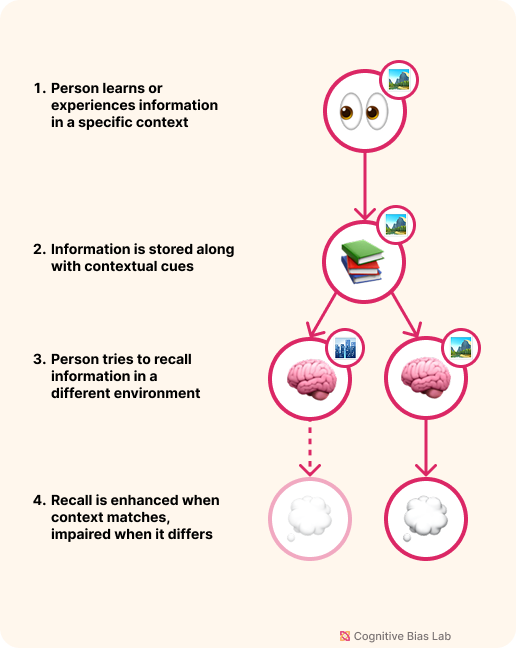Context Effect
Your progress on this bias test won't be saved after you close your browser.
Understanding Context Effect
Context Effect
Our perception, memory, and decisions are significantly influenced by the environmental and emotional context in which information is encoded or retrieved.
Overview
The Context Effect refers to the psychological phenomenon where the environmental, emotional, and situational context in which information is learned or recalled significantly influences memory, perception, and decision-making. What we remember—and how we interpret that memory—can change depending on cues present during encoding (learning) or retrieval (remembering).
How It Works
When we experience an event, our brain doesn’t just store the core information; it also encodes background details like the physical setting, emotional state, and surrounding stimuli. Later, when we try to recall that event, these contextual cues can either enhance memory (if similar cues are present) or hinder it (if the context has changed).
For example, someone may remember more facts about a lecture when they’re sitting in the same classroom where they originally learned the material. Similarly, a memory formed while sad might be more easily recalled when in a similar emotional state—this is known as state-dependent memory, a subtype of the context effect.
Implications and Applications
- Eyewitness Testimony: Small changes in a courtroom’s atmosphere or questioning style can distort an eyewitness’s memory by altering retrieval context.
- Learning & Studying: Students often recall information more effectively when tested in the same environment where they studied.
- Consumer Behavior: Ambient music, lighting, or scent in stores can shape how we interpret a product’s quality or appeal.
Key Insight
Context doesn’t just surround our experiences—it shapes the very way we understand and remember them. Recognizing this can help improve learning, communication, and judgment by aligning environments with desired cognitive outcomes.

Visual representation of Context Effect (click to enlarge)
Examples of Context Effect
Here are some real-world examples that demonstrate how this bias affects our thinking:
Eyewitness Testimony Distortion
A witness observes a crime in a dimly lit environment while feeling intensely frightened. When later interviewed in a bright, sterile police station while feeling safe and calm, they struggle to recall critical details. However, when investigators bring the witness back to a similar environment with comparable lighting and emotional triggers, previously inaccessible memories suddenly become available. This demonstrates how both physical context and emotional state powerfully influence what we can remember.
Brand Recall
A customer watches a winter coat commercial featuring soft instrumental music, dim lighting, and visuals of warm interiors. The brand and product leave a faint impression. A week later, while shopping, they enter a store that plays the same music and has similar atmosphere. Instantly, they recall the exact coat and brand from the ad. The matching sensory cues between the ad and the physical store reactivated the memory.
How to Overcome Context Effect
Here are strategies to help you recognize and overcome this bias:
State-Dependent Practice
Rehearse key tasks in conditions similar to where you will perform them. For example, stand while practicing a presentation or study under mild stress if you expect a stressful test.
Shift Decision Contexts
Evaluate important choices in different settings and emotional states. This helps you detect how context may influence your thinking and reveals what remains consistent.
Test Your Understanding
Challenge yourself with these questions to see how well you understand this cognitive bias:
Someone is choosing between two job offers. They evaluate them once while relaxed at home and again during a stressful morning commute. Their preferences shift between settings. What does this suggest?
Academic References
- Godden, D. R., & Baddeley, A. D. (1975). CONTEXT‐DEPENDENT MEMORY IN TWO NATURAL ENVIRONMENTS: ON LAND AND UNDERWATER. British Journal of Psychology, 66(3), 325–331
- Evangelidis, I., Bhatia, S., Levav, J., & Simonson, I. (2024). 50 years of Context Effects: Merging the behavioral and quantitative perspectives. Journal of Consumer Research, 51(1), 19–28.
- Wagner, B. J., Wolf, H. B., & Kiebel, S. J. (2024). The role of repetition in context-dependent preference. bioRxiv (Cold Spring Harbor Laboratory).